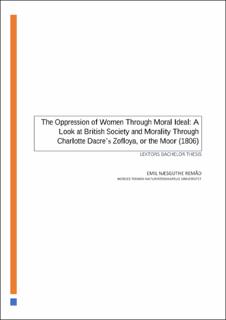| dc.description.abstract | In this thesis I have looked at some of the historical context surrounding the British society during the time Zofloya, or the Moor was written. An empire at a standstill, with a grand upheaval in a similar European country, felt threatened that a similar situation might happen in their own society. This in turn led to an attempt to consolidate what they perceived as the proper and strong British identity. Sadly, this meant suppressing the rising number of women who wished for a change in gender norms. This was done with help from different institutions in the British society, and when combining state and religion, the new separate spheres of masculinity and femininity emerged. During this thesis I have brought up how I interpret Charlotte Dacres book as a critique of this form of morality, especially the reductionist image of women as domestic teachers, who had to be contained from their own sexuality and actions in fear of corrupting the British ideal society. She also rejects the notion of “generational sins” through her representation of Victoria and her brother, by showing arguing for individualism and personal accountability, and satirizing the idea of women and men as completely shaped by the bad actions of their mother. By writing about Victoria, a protagonist who repeatedly transgress the moral ideal for women at the time by being a violent, proud, evil, and driven young woman she is able to portray a complex character with positive and negative traits, directly opposing the view of what proper womanhood entailed. However, by critiquing the aspects of Victoria who reiterate the moral teachings of society around, her she manages to critique some of the major aspects of the sexist morals pushed by British society at the time. Zofloya, Or the Moor thus represents a multitude of critiques towards the moral standards put on women at the time. | |
